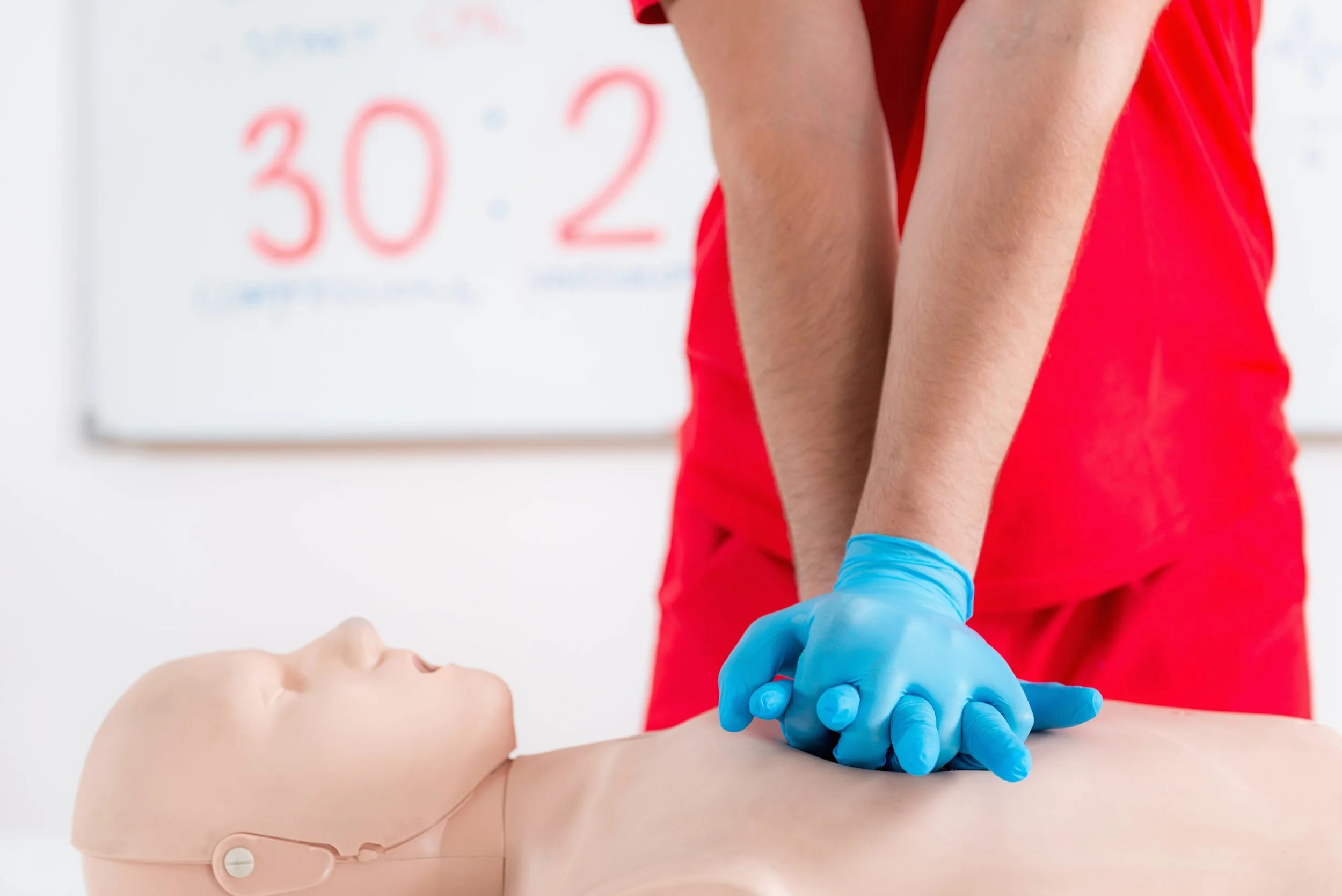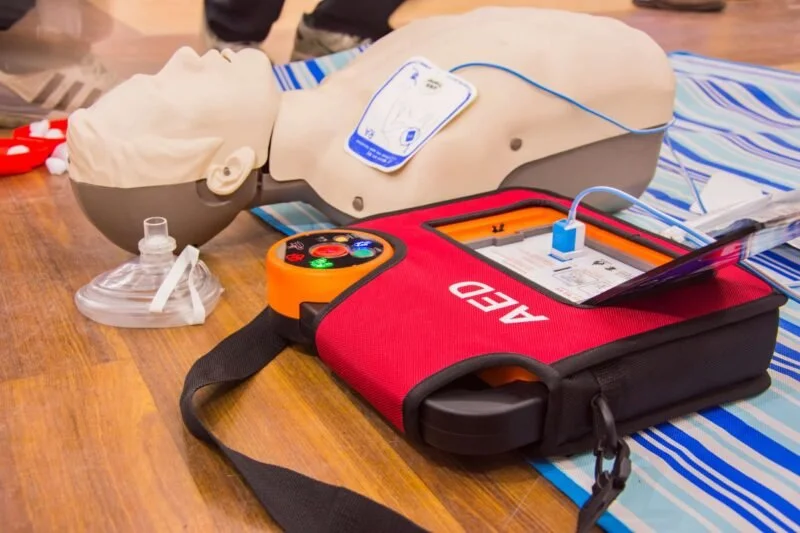
FIRST AID TRAINING

Dynamic Ocean Consulting provides First Aid Training programs tailored for marine and occupational environments. Our certified instructors deliver practical, safety-focused instruction designed to meet WorkSafe BC and Transport Canada requirements.
Training can be arranged in custom class sizes and is available through online learning modules or in-person sessions, offering flexibility for individuals and organizations.
Courses Offered
Standard First Aid and CPR – Comprehensive first aid skills including patient assessment, wound care, and CPR for adult, child, and infant emergencies.
CPR and AED – Focused training on cardiopulmonary resuscitation and automated external defibrillator use for rapid emergency response.
Marine Advanced First Aid – In-depth course designed for mariners and marine professionals, covering advanced emergency care, remote environment response, and Transport Canada marine medical standards.
Each course emphasizes real-world application and marine-specific scenarios, ensuring participants are confident and compliant with industry standards.
Flexible scheduling and custom programs available.
Contact Dynamic Ocean Consulting to register or request a tailored training session for your team. See course details bellow.

Standard First Aid and CPR
-
Comprehensive two-day course offering first aid and cardiopulmonary resuscitation (CPR) skills for those who need training due to work requirements or who want more knowledge to respond to emergencies at home.
-
Red Cross First Aid Instructor
-
100% attendance and participation; 75% min. passing grade on a written, closed book knowledge evaluation; and adherence to the Fundamental Principles.
-
3-year certification in Standard First Aid, CPR Level A or C, and AED
-
Standard First Aid: 6.5–7.5 hours; includes CPR Level A or C and AED; adheres to local legislation
Blended Standard First Aid: 4 hours online learning*, 3-4 hours teaching time
*Online learning time may vary depending on the learner -
The Red Cross
Preparing to respond
The EMS system
Check, Call, Care
Airway emergencies
Breathing and circulation emergencies
First aid for respiratory and cardiac arrest
Wound care
Head, neck and spine injuries
Bone, muscle and joint injuries
Sudden Medical Emergencies
Environmental illnesses
Poisons (includes opioid poisoning)
Includes any other content required by specific legislation
A 60-minute Opioid Poisoning Awareness Workshop can be added to this course. In this workshop, participants will learn how they can help prevent death and disability by recognizing, accessing help, and providing care for a suspected opioid poisoning. -
First Aid & CPR (print and/or eBook)
Comprehensive Guide to First Aid & CPR (eBook)
Standard First Aid – Online (Blended only)
Standard First Aid certificate (digital certificate issued upon successful completion)

CPR and AED
-
Courses on cardiopulmonary resuscitation (CPR) provide the skills needed to recognize and respond to cardiovascular emergencies and choking for adults, children, and babies depending on the level of CPR chosen. Courses meet legislation requirements for provincial/territorial worker safety and insurance boards, and include the latest CPR guidelines and training in the use of an automated external defibrillator (AED).
-
CPR Instructor or First Aid Instructor
-
• Successfully demonstrate skills and critical steps
• Min. 75% mark for written knowledge evaluation
• Attend and participate in 100% of the course
-
3-year certification in CPR Level A or C
-
Recertification of CPR A is not available. Recertification for CPR C is 3.5 hours teaching time in-class OR 2 hours online learning + 2.5 hours in-class for Blended CPR.
-
Level A
The Red Cross
Responding to Emergencies
Check, Call, Care
Recovery position
Choking – adult
Assisting with medications
Angina and heart attack
CPR and AED– adult
Deadly bleeding
Level C
Level A content
Choking - child and baby
CPR - child and baby
Includes any other content required by specific legislation
-
CPR (print and/or eBook)
Comprehensive Guide to First Aid & CPR (eBook)
CPR – Online (Blended only)
CPR certificate (digital certificate issued upon successful completion)

Marine Advanced First Aid
-
Designed to provide participants with the skills and knowledge required to apply immediate first aid in the event of accident or illness on board a vessel. Participants will gain knowledge of marine first aid equipment, and the transferring of patients from a ship. All aspects of course are focused in a marine setting. Course meets the requirements of Transport Canada outlined in Transport Publication (TP) 13008E.
-
Any person designated to provide first aid on board a vessel engaged on a near coastal voyage, class 1, or unlimited voyage. Participants who want to obtain a master or officer certificate or endorsement.
-
Successfully demonstrate the course skills competencies
Minimum 75% mark for written, closed book, knowledge evaluation
Successfully complete two evaluated scenarios (one medical and one trauma)
Attend and participate in 100% of the course
-
3-year Red Cross certification in Marine Advanced First Aid and a Transport Canada certification. Certificates are issued by Red Cross upon successful completion.
-
Recertification of Marine First Aid is not permitted by Transport Canada TP 13008E
-
The Professional Responder
Responding to the call
Infection prevention and control
Anatomy and physiology
Assessment
Airway management and respiratory emergencies
Circulatory emergencies
Shock
Hemorrhage and soft tissue trauma
Musculoskeletal injuries
Chest, abdominal and pelvic injuries
Head and spinal injuries
Acute and chronic illnesses
Poisoning
Environmental illnesses
Pregnancy, labour and delivery
Special populations
Crisis intervention
Reaching, lifting and extricating patients
Multiple-casualty incidents
Pharmacology
Marine environment
Workplace
-
Canadian Red Cross Emergency Care for Professional Responders Reference Text
Canadian Red Cross Emergency Care for Professional Responders Workbook (optional)




